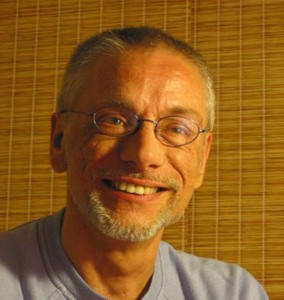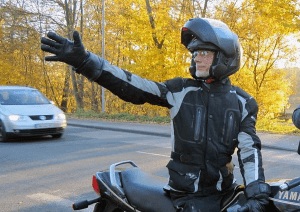
Tom from Duisburg is only 53, but already retired. The reason: he contracted AIDS in 1994 and only just survived. Since the trained tax assistant has recovered, he has been involved with the AIDS organisation. Philip Eicker spoke to him about his voluntary work at Online Health Support (OHS), the health chat for gay men at Gayromeo.
Tom, you are a health supporter. Anyone at Gayromeo who wants to know something about safer sex can contact you. Are you being bombarded with enquiries?
No, that only happens rarely. Sometimes I don't receive a single message for an hour or two. I'm usually doing other things on the PC or my back exercises at the same time. When an enquiry comes in, I can hear it from the signal tone. One exception was World Aids Day 2007, when I was the only supporter online for a few hours. But after a few hours, luckily a few of my colleagues joined me.
You've been with us since the beginning in 2007. How many questions have you answered since then?
I don't know, but I could work it out for you, we keep tally sheets. On average, I answer around 1,000 enquiries a year. It has become less in recent years. In 2009, I received 1,095 enquiries in the first half of the year alone.
Do you sometimes get writer's cramp from typing so much?
No, I actually enjoy it. I'm a trained tax assistant and can type using the ten-finger system.
How often are you online?
Very different. Sometimes a few hours several times a day, sometimes not at all. On average, it's 18 hours a week. Every health supporter has a contract, I have a contract with Aidshilfe Duisburg - which cooperates with Deutsche AIDS-Hilfe, which in turn cooperates with Gayromeo. My working hours are also precisely regulated in this contract. We commit to being online for at least ten hours a month. There are 66 supporter profiles in total, some of which are group profiles, so there are around 80 counsellors available. This means that a supporter is almost always online.
What do people want to know about you?
We do a lot of sex gleaning. Many people ask: Was this or that safe? Or they describe symptoms and want an assessment of what it could be. The first thing I tell them is that we're not doctors and can't make a remote diagnosis, we can only make an assumption. Mostly, however, it's about assessing the risk of infection. Unprotected oral sex is a perennial favourite. However, the probability of becoming infected with HIV is very low. This still causes a lot of uncertainty.
Do you have an answer to all the questions?
No, of course not. But for such cases, I have up-to-date reference books where I can look things up. You also get a kind of training as a health supporter. First I did a basic training course - just like anyone who wants to volunteer for an AIDS service organisation. Nobody is let loose with dangerous half-knowledge. I then received a weekend of further training for online health support: one day was about medical facts, one day was about the internet itself.
What do you learn there?
You train communication in the chat. The most striking example for me is the so-called reduction of communication channels. Unlike on the phone, for example, you don't know what the other person is like in a chat: you can't hear their tone of voice, volume or laughter. That's why you have to be very restrained in your expression so that there are no misunderstandings. Irony, for example, is very problematic.
What is the most difficult part of your job?
The level of knowledge about HIV is very different, but you still have to try to do justice to everyone. Safer sex has many levels. Expressing the information in a way that everyone understands is not that easy.

Volunteering: Tom from Duisburg Did you consciously choose a gay voluntary position?
Yes, very specifically. I tested positive in 1985 and had full-blown Aids in 1994. Back then, I was often dependent on support from AIDS service organisations. I would now like to give a little of that back. Almost 80 per cent of HIV-positive people in Germany are gay men - what could be more obvious than getting involved here? I was once on the board of AIDS-Hilfe Duisburg for three years, but that wasn't for me. I'm not into clubbing. (laughs)
Would you like to show your appreciation?
Yes, I've been retired for 18 years because of HIV. As I'm a burden on the community, it feels good to be able to give something back. As a positive person, I also feel the need to support other people so that they don't get infected like I did. I want to give them the information they need so that they can make a good decision for themselves.
Have you ever thought about giving up your voluntary work?
Yes, once. I wasn't feeling well personally at the time. Roughly summarised: I was unhappily in love. I briefly considered whether I should still do this to myself. But then I said to myself: there's not that much to do after all - and I can almost manage the ten-hour minimum commitment in my sleep. (laughs) But back then I resolved to stop building up frustration. When I'm grumpy, I prefer to keep my profile closed. Then there's no point - and it doesn't help the user either if I'm sitting in front of my screen in a bad mood.
Do the users know that you are positive?
Yes, it's right there in my profile heading. Since I wrote that in, I've been getting a lot of enquiries from people who have just got a positive HIV test result or are worried that they might be infected. They want to know: What will happen to me now? I can usually reassure them. For example, by saying: I've been positive for 28 years and I'm fine - even though my starting position was much worse back then. That gives them courage. Then I immediately know what I'm good for again. That's incredibly positive feedback!
Interview: Philip Eicker
A short portrait of Tom can be seen on 3sat. In the programme "Nano", he talks about his life with HIV.
Online health support at Gayromeo is coordinated by Deutsche AIDS-Hilfe and kept running by several prevention teams in Germany, Austria, Switzerland and the Netherlands. In North Rhine-Westphalia, "Herzenslust" ensures that there are well-trained online counsellors who network and receive further training once a year. The projects and campaigns organised by the Herzenslust state working group - for example at the CSDs in NRW - are aimed at gay men and other men who have sex with men. They are designed to specifically address feelings. The aim is not just to disseminate up-to-date health information, but to make gay men want to have sex - despite HIV and other sexually transmitted diseases. Anyone who would like to help can find out more under "Heroes wanted!".
http://www.herzenslust.de/herzenslust/front_content.php?idcat=1223









